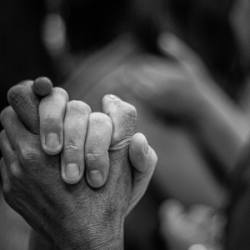Reconstructionist
Contemporary Judaism should treat equality as a legal and halachic value and uphold it with zeal. Instead of asking, "Who cares what women wear?" why not ask, "Who cares what people wear?"
Even in our increasingly egalitarian age, women bear unequal burdens. Modesty is expected more of women than men. Women's bodies are more often exploited for profit by various media. These moment/images offer distorted views of what bodies are for and what women "should" look like.
Pressure over what to wear drains energy and money better spent on tzedakah or tikkun olam. It can also lead to eating disorders, even in young girls, making a de-emphasis of appearances a public health imperative. Clothing can be a fun and attractive realm of self-expression, but the real purpose of clothes is more basic (just ask the millions who can't afford them). We'd all be well served by a bit more sartorial utilitarianism.
Modesty, or tziniut, is a key value in our era of baring all. But another important value is kavod, respect, which is a two-way street. Walking into an Orthodox neighborhood or mosque or many churches, we should cover ourselves, honoring the minhag hamakom, local custom. But the custom in Miami or Tel Aviv is quite different, and religious coercion is not the way to go. Freedom of dress is closely intertwined with still greater freedoms, such as assembly, press, and religion. Let's not abuse that freedom, but uphold it.
Rabbi Fred Scherlinder Dobb
Adat Shalom Reconstructionist Congregation
Bethesda, MD
Renewal
Could the Sanhedrin, the rabbinic court in Temple and post-Temple times, make the same kind of decisions when meeting in the Temple as when meeting elsewhere? The Talmudic determination was "no" because location affects decisions. Although the Talmud was dealing with capital offenses, this principle can be relevant to many issues today, including the question of modesty. A one-piece bathing suit worn at the beach is modest compared with a bikini, but a one-piece bathing suit worn in a restaurant is considered revealing even if worn with a skirt or pants.
When I became a pulpit rabbi in the early 1990s, I asked the mothers of bar and bat mitzvah celebrants to wear a skirt or dress on the bima. Some congregants informed me that they considered nice slacks to be modest when accompanied by tops that covered their chests and shoulders. When the female president of my congregation appeared at High Holy Day services in slacks, I realized that I needed to change my standards. And I did.
When visiting a congregation, both women and men should be attuned to the minhag hamakom, the custom of the place, in dress as in other things. I wear a kippah almost every day. I wear a tallit when attending a Reform, Conservative, Reconstructionist, or Renewal synagogue, but as a woman, I wouldn't think of wearing either in an Orthodox synagogue.
Respect in dress is, to my mind, a form of modesty because when we are modest, we don't call attention to ourselves; we can be beautiful and modest at the same time.
Rabbi Pamela Frydan Baugh
Administrative Director of OHALAH: Association of Rabbis for Jewish Renewal
Independent
No one ought to care what women wear. I am against burdening women with the responsibility of curbing the sensuous impulses of men by restricting their choice of dress and degree of exposure. Immodesty has to do with drawing unnecessary attention to yourself; wearing long sleeves and ankle-long skirts would be considered "immodest" in a community where women wear short sleeves and short skirts because it would draw unnecessary attention, conjuring up others' judgment and assumptions.
As the late ultra-Orthodox rabbinic authority Rav Moshe Feinstein boldly pointed out, there is no Torah injunction against nudity. Remember how our great chieftain King David danced in front of the holy Ark of the Covenant in just a loincloth?
Women should be encouraged to connect with their God-given beauty in any way that makes them feel comfortable, admired, and appreciated -- and that heightens their self-esteem and sense of self. Let the men who complain about it free their sisters from being burdened to protect them from their own lewd thoughts.
Rabbi Gershon Winkler
Walking Stick Foundation
Thousand Oaks, CA
Humanist
Dressing modestly is really code for not dressing revealingly, seductively or, according to some, sinfully. But what transgresses "normal" in some cultures or families is attractive and appealing in others. Even within cultures, what is comfortable for one person may not be for another. Ultimately, each person must figure out what works for them -- not on the basis of limitations imposed from outside, but of those within, including how at ease we are with our own bodies. That's part of the story of freedom and personal emancipation that we treasure.
Rabbi Peter H. Schweitzer
The City Congregation for Humanistic Judaism
New York, NY
This article was first published at Moment Magazine, a Patheos Partner, and is reprinted with permission.




